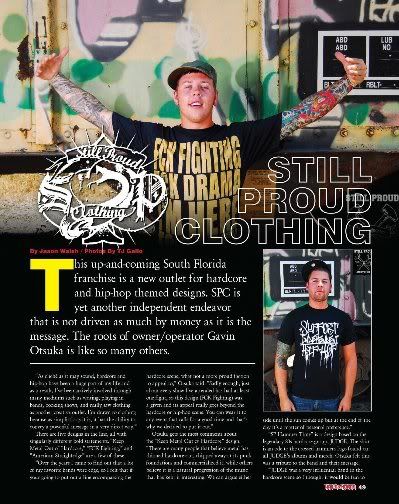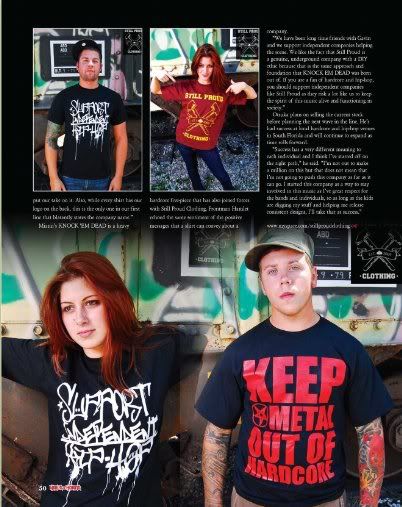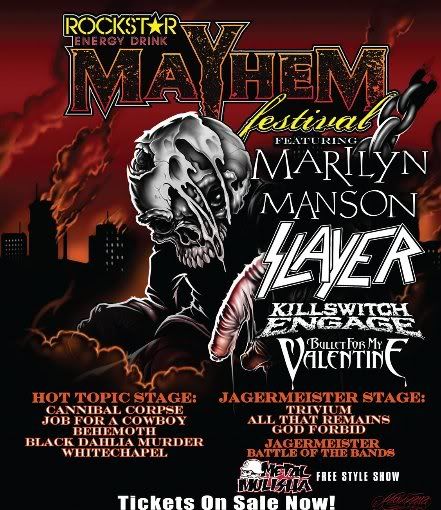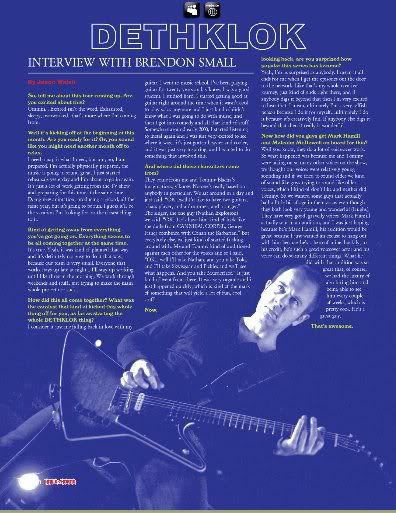
DETHKLOK
by Jason Walsh
Returning for their third season, the world’s most brutal death metal band will not only be desecrating the newly digitized airwaves around the globe, but taking the show on the road, literally, to a venue likely near you. That’s right…the five most evil musicians in the history of mankind have joined forces with Mastodon, Converge, and High on Fire for a 38-city North American Tour. DETHKLOK, the notorious stars of Adult Swim’s “Metalocalypse” animated series, will be performing live to the metal masses across the continent…well, sort of…
For those not in the know, DETHKLOK is the blackest of black metal bands in the lands, but they are also the cartoon manifestation from the minds of Brendan Small and Tommy Blacha, who began this odyssey back in 2004. Brendon was a guitar virtuoso, who graduated from Berklee College of Music, and later pursued a career in standup comedy, leading to his first gig in comedic animation with the UPN series, “Home Movies.” On this project, he was involved in near every aspect: co-creator, composer, musician, writer, and voice actor. When “Home Movies” wrapped, Brendon started hanging out with writer friend Tommy Blacha, going to metal shows and rejuvenating his love of the music, when one day the two came up with the idea…DETHKLOK.
The two pitched it to Cartoon Network’s Adult Swim and were greenlighted for 20 episodes of the show “Metalocalypse” in 2006, which would feature their incarnation, the ultimate metal band, in an apocalyptic society where they are worshipped by the suicidal masses. The 11-minute episodes have a nod to the 80s groundbreaking animated feature, “Heavy Metal,” stirred together with twenty-first century technology, melted down to completion with the heaviest of heavy soundtracks. Brutal…
So meet the band…Nathan Explosion is the ever tempermental Cimmerian front man, followed by the dueling guitar duo of Skwisgaar Skwigelf, the fair-haired Swedish lead shredder with an Yngwie Malmsteen-like god-complex and propensity for mature women, and Toki Wartooth, the sickly Norwegian rhythm guitarist who is continuously tormented by Skwisgaar. On bass, William Murderface, the deranged and potential serial killer with a low self opinion, keeps the rhythm section going (when he’s not being muted from the mix) with drummer, Pickles, rocking his combed-over dreaded balding mullet and notoriety as legendary front man and lead guitarist in his previous band, Snakes ‘n Barrels (a parody of Hollywood’s GNR glam exploits).
Brendon is the man behind the curtain…music composer, voice actor, and shared producing and writing credits with Tommy Blacha. “Metalocalypse” also features the vocal talents of Mark Hamill, Malcolm McDowell, and Victor Brandt, and has seen guest appearances by almost everyone throughout the professional metal community, including members of Metallica, Megadeth, Cannibal Corpse, Emperor, and King Diamond. With the wide appeal amongst viewers of “Metalocalypse’s” first season, he decided to produce and release the first album by DETHKLOK from the musical work he did for the show. “The Dethalbum,” released in 2007 on Time Warner’s William Street Records, reached fans throughout the metal community. Charting higher than any other death metal band on the Billboard 200, debuting at #21, the record sold 33,740 units its first week as well as streaming more than 45,000 times on AOL Music. This led Brendon to put together a band with studio and session musicians, to play the music from these ink-and-microchip-created incarnations…LIVE!
And they did…with former Frank Zappa guitarist Mike Keneally, fellow Berklee graduate Bryan Beller on bass, and the infamous Gene Holgan on drums, whose resume includes Death, Testament, Dark Angel, and Fear Factory. A successful score of college dates saw positive response for the four-piece stand-ins of the show’s menacing quartet. Future travels on the road saw the band alongside the likes of Chimera and Soilent Green, then finding themselves opening for Iron Maiden at Montreal’s Heavy MTL festival.
Season Two returned watchers in 2007 to the dimensionally deranged universe of DETHKLOK, with twenty more 11-minute vignettes. Season Three premiered this October, now expanded to a half-hour block. Prior to the show’s debut, the sequel release, “The Dethalbum II,” hit the market on September 29. This has all led to the North American tour supporting Mastodon that kicked off in October as well. I had a chance to talk to Brendon as he was getting AMP’d up to hit the road.
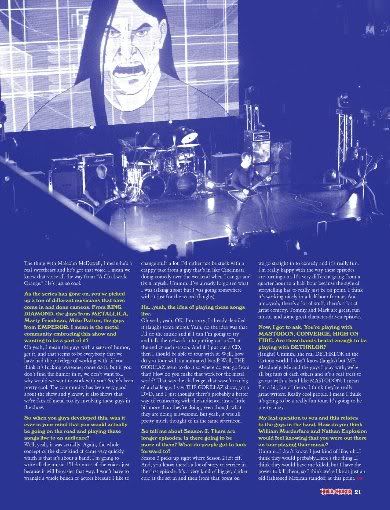
JW: How are you doing today?
BRENDON: Oh, I’m good, thank you very much. How about you?
JW: Not bad, not bad. So, tell me about this tour coming up. Are you excited about this?
BRENDON: Ummm…Excited isn’t the word. Exhausted, sleepy, overworked…that’s more where I’m coming from.
JW: Well it’s kicking off at the beginning of this month. Are you ready for it? Or, you sound like you might need another month off to relax.
BRENDON: I need a nap is what I need, but um, no, I am prepared. I’m actually physically prepared, the music is going to sound great. I just started rehearsals yesterday and I’m about to go in again. It’s just a lot of work getting from the TV show and preparing for this tour at the same time. Doing new animation, producing a record, all the same year, but it’s going to be fun. I guess it’ll be the vacation I’m looking for, or the closest thing to it.
JW: Kind of getting away from everything you’ve got going on. Everything seems to be all coming together at the same time.
BRENDON: It’s true. Yeah, it was kind of planned that way and it’s definitely not easy to do it that way, because our team is very small. Everyone that works stays up late at night..I’ll stay up working until like three in the morning. We work through weekends and stuff, just trying to make the main whole project not suck.
JW: How did this all come together? What was the catalyst that kind of kicked this whole thing off for you, as far as starting the whole DETHKLOK thing?
BRENDON: I consider it just me falling back in love with my guitar. I went to music school. I’ve been playing guitar for twenty years and, y’know, I was a good student. I studied hard. I started getting good at guitar right around the time when it wasn’t cool to play solos anymore and I just kind of didn’t know what I was going to do with music, and then I got into comedy and all that kind of stuff. Somewhere around early 2000, I started listening to metal again and I was just very excited to see where it was…it’s just gotten heavier and cooler, and it was just very inspiring, and I wanted to do something that involved this.
JW: And where did these characters come from?
BRENDON: They come from me and Tommy Blacha’s imaginations, y’know. No one’s really based on anybody in particular. We sat around in a day and just said, “OK…well I’d like to have two guitars, a bass player, and a drummer, and a singer.” The singer, the one guy (NATHAN EXPLOSION) we said, “OK…Let’s have him kind of look like the dude from CANNIBAL CORPSE, George Fisher combined with Conan the Barbarian.” But everybody else, we just kind of started fucking around with. Me and Tommy kind of auditioned against each other for the voices and so I said, “OK..well I’ll take Nathan, and you take Toki, and I’ll take Skwisgaar and Pickles and we’ll see what happens. And you take Murderface.” It just kind of went from there. It was very organic and it just happened quickly, which is kind of the mark of something that will yield a lot of fun, cool stuff.
JW: Now, looking back, are you surprised how popular this series has become?
BRENDON: Yeah, I’m as surprised as anybody. I mean it all ends for me when I get the episodes out the door to the network. Like that’s my whole creative journey, just kind of ends right there, and if anybody digs it beyond that then I’m very excited to hear that. I mean, ultimately I’m a very selfish person because I do it for myself….ultimately I do it because it’s creatively fun. If anybody else digs it beyond that then it really is wonderful.
JW: Now how did you guys get Mark Hamill and Malcolm McDowell on board for this?
BRENDON: Well you know, they do a lot of voice-over work. So what happened was because me and Tommy were taking on so many other voices on the show, we thought our voices were relatively young sounding and if we tried to sound older we kind of sound like guys trying to sound like older voices, which I kind of don’t like and neither did Tommy. So we wanted some guys that actually had a little bit of age in their voice, even though they both look very young and wonderful (laughs). They have very good, gravelly voices. Mark Hamill actually sent in an audition, and I was just hoping because he’s Mark Hamill, his audition would be great because I just wanted an excuse to hang out with him because he’s a hero of mine. Luckily, to his credit, he’s such a good voiceover actor and his voice can do so many different things. What he did with that audition was so great that, of course, we had the luxury of also hiring him and being able to see him every couple of weeks, which is pretty cool. He’s a great guy.
JW: That’s awesome.
BRENDON: The thing with Malcolm McDowell, I mean he’s a real sweetheart and he’s got that voice. I mean we know that voice all the way from “A Clockwork Orange.” He’s just so cool.
JW: As the series has gone on, you’ve picked up a ton of different musicians that have come in and done cameos. From KING DIAMOND, the guys from METALLICA, Marty Friedman, Mike Patton, the guys from EMPEROR. I mean is the metal community embracing this show and wanting tgo be a part of it?
BRENDON: Oh yeah, I mean the guys with a sense of humor, get it, and that seems to be everybody that we have had the privilege of working with…if you think it’s fucking awesome, come do it, but if you don’t find the humor in it, we don’t want to…why would we want to work with you? So, it’s been pretty cool. The community has been very good about the show and y’know, it also shows that we’re fans of metal too by involving these guys in the show.
JW: So when you guys developed this, was it ever in your mind that you would actually be going on the road and playing these songs live to an audience?
BRENDON: Well, yeah, it was actually. Again, the whole concept of the show kind of came very quickly which is that it’s about a band, I’m going to write all the music, I’ll do most of the voices just because it will be easier that way. I won’t have to wrangle a whole bunch of actors because I like to change stuff a lot. I’d rather not be stuck with a crappy take from a guy that’s in like Cincinnati doing comedy over the weekend when I can go and fix it myself. Ummm…I’ve already forgotten what I was talking about but I was going somewhere with it just for the record (laughs).
JW: Ha…yeah, the idea of playing these songs live.
BRENDON: Oh yeah, yeah. OK. I’m sorry, I already derailed it (laughs some more). Yeah, no the idea was that I’ll do the music and if I can I’m going to try and talk the network into putting out a CD at the end of each season. And if I put out a CD, then I should be able to tour with it. Well, how do you tour with an animated band? Well, THE GORLLAZ seem to do it so where do you go from that? How do you make that work for the metal world? That was the challenge, that wasn’t too big of a challenge. I saw THE GORILLAZ show, got a DVD, and I just thought there’s probably a better way of connecting with the audience, just a little bit more than they’re doing, even though what they are doing is awesome. But yeah, it was all pretty much thought of in the same afternoon.
JW: So tell me about Season 3. There are longer episodes. Is there going to be more of them? What do people got to look forward to?
BRENDON: Season 3 picks up right where Season 2 left off. And, you know there’s a lot of story to service in the first episode. It’s a very kind of bigger, darker epic at the set in and then from that point on we go straight in to comedy and it’s really fun. I’m really happy with the way these episodes are turning out. It’s very different going from a quarter hour to a half hour because the style of storytelling has to really just be on point. I think it’s working nicely in a half-hour format. And um…yeah, there’s a lot of stuff, there’s a lot of great comedy. Tommy and Mark are great, fun music, and some great character-driven episodes.
JW: Now, I got to ask. You’re playing with MASTODON, CONVERGE, HIGH ON FIRE. Are these bands brutal enough to be playing with DETHKLOK?
BRENDON: (laughs) Ummm…the real DETHKLOK in the cartoon world. I don’t know (laughs) but ME. Absolutely. Me and the guys I play with, we’re all big fans of each others and it’s a real treat to go out with a band like MASTODON. I mean I’m a big fan of theirs. I think they’re really great writers. Really cool people. I mean I think it’s going to be a really fun tour. It’s going to be pretty crazy.
JW: My last question to you and this relates to the guys in the band. How do you think William Murderface and Nathan Explosion would feel knowing that you were out there on tour playing their music?
BRENDON: Ummm…I don’t know. I just kind of like, uh…I think they would probably…here’s the thing…I think they would have me killed but I have the power to kill them, so I think we’re like at just an old fashioned Mexican standoff at this point.
UPDATE FROM THE AMP/HAILS NEWSDESK: Reports that Brendon Small has been taken to an undisclosed location by DETHKLOK’s private army of KLOKATEERS has been denied by DETHKLOK manager and publicist Charles Foster Ofdensen. Ofdensen went on to say that the band does not recognize the existence of Small, nor will he be any part of their continual conquest and worldwide domination through brutality. Have a nice day…

http://www.diefordethklok.org/
